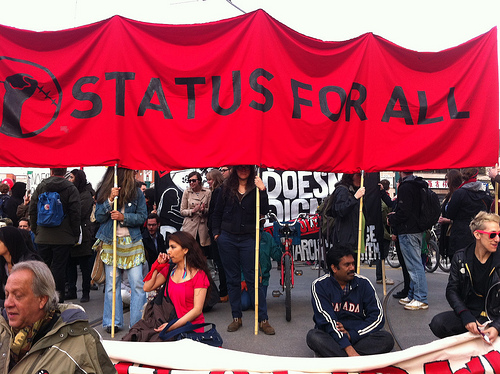For seven years, thousands have marched through the streets of Toronto on May 1, demanding status for all, immigrant rights and worker rights. Supporting indigenous communities and environmental justice. Calling for an end to racism, ageism, sexism, homophobia and transphobia.
“And on February 21, Toronto City Council voted to reaffirm its promise to deliver services to every resident regardless of immigration status,” said Tings Chak, a member of No One is Illegal Toronto.
“We will continue to build a solidarity city, where communities work together to ensure justice and dignity for all residents. The history of access without fear is a long one.”
On Wednesday, close to 2,000 people gathered on Queen Street in front of City Hall, celebrating their victories while pledging to continue the struggle to build a city accountable to people all over the world.
A city that will accept everyone, regardless of whether they hold immigration papers. A city that will stand up for its people.
“This is us,” said Chak. “We are workers, migrants, students, people of colour.”
Who came together in solidarity on Wednesday evening as friends, families and comrades. Who have watched the Harper government pass “unjust laws” and the Ontario government refuse to support their families.
“And we have seen Rob Ford try to deny us dignity,” said Chak.
“Did we accept?”
“No,” shouted the crowd.
“Did we sit quietly?”
“No.”
“Did we remain silent?”
“No.”
“We resisted together.”
Singing, speaking, writing and marching.
“Though there are days when we feel it’s quite hopeless, we know we can rely on each other,” she said. “We will never be defeated.”
For years, No One Is Illegal Toronto has organized demonstrations to show the rest of the country the “beauty, resilience and strength” of migrants and refugees, undocumented people and immigrants.
“We insisted that the forces that push us out of our homes, here and abroad, must be stopped,” said Chak. “The forces that make our lives miserable.”
Especially those that pass anti-immigrant laws. Those that push through omnibus bills that take away the rights of native people.
“We will not allow that to happen,” said Crystal Sinclair, Idle No More Toronto. “We will continue to exercise our sovereignty.”
Native communities travelled from all over Ontario to attend Wednesday’s May Day rally and march, marking International Workers’ Day.
“We have to be unified,” said Sinclair. “We have to take a stand against oppressive policies.”
Policies that will harm the land, the rivers and the waters.
“Otherwise we will be left with nothing but poisoned water,” she said. “Everything on this land needs water to live.”
So they marched west along Queen Street with a 200-foot wampum, arriving more than an hour later outside the offices of Joe Fresh, Loblaw’s discount clothing chain.
“Hey Joe Fresh you can’t hide, we can see your greedy side,” chanted the crowd.
Last week, a building collapsed in Savar, Bangladesh killing more than 400 workers and injuring hundreds of others. The factory supplied clothes for numerous retailers, including Joe Fresh.
The outsourcing of the garment industry to countries like Bangladesh, where there is a plentiful supply of cheap labour, has become common practice by many retailers. The lack of employment standards and health and safety regulations has left workers vulnerable to injuries or death.
Free trade agreements have contributed greatly to retailers shipping their production out of North America and into countries like Bangladesh and China.
“Joe Fresh, the manufacturers and the owners of the buildings have to take responsibility,”said Farah Kabir, a spokesperson for ActionAid, an international organization dedicated to eradicating poverty andinjustice.
“Savar was not an accident. Savar could have been avoided.”
But the demand for low cost production trumped worker safety and security.
Kabir demanded that the Bangladesh government allow workers to organize and join trade unions.
“We don’t want compensation for the deaths,” said Kabir. “Can you bring them back? Can you bring their limbs back?
“Why should people work for 12 cents when you charge $40 for a T-shirt?”
Following Kabir’s speech, a moment of silence was observed for the workers killed in Savar as well as those still missing.
Members of the Bangladeshi community then approached the entrance of the Joe Fresh building to deliver a letter demanding better living and working conditions for garment workers.
The police opened up their line but Joe Fresh wouldn’t open their doors to receive the letter. A few minutes later, the sliding doors were opened a crack and the letter was taken by a security guard.
Then the crowd marched towards Little Norway Park to offer their support to Porter Airlines workers who’ve been on strike since January trying to negotiate their first collective agreement.
“The solidarity means a lot to us,” said Ryan. “With the labour movement under attack, solidarity is the most important thing.”
Porter workers decided to form a union with the Canadian Office and Professional Employees Union (COPE) last year, accusing their employer of “sloppy health and safety practices.”
On their website, Don’t Fly Porter, workers encourage the public not to fly with Porter until the airline negotiates a fair settlement with them.
“Anything you guys can do to bring us back to the bargaining table would be appreciated,” said Ivan, another Porter worker.
According to the union, Porter has not budged on its position of a 25-cent increase for half the workers and nothing for the remainder.
Photo by Krystalline Kraus, rabbleca/flickr



